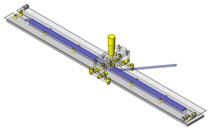(!) Since support from Microsoft will end on January 14th, 2020, Windows 7 will be excluded from the recommended environment from December 15th, 2019 on this site. Vì lý do Microsoft kết thúc hỗ trợ cho Windows 7 vào ngày 14/01/2020, Windows 7 sẽ là hệ điều hành không được khuyến khích sử dụng với trang web này từ ngày 15/12/2019.
Search by Category / Brand Tìm theo danh mục, nhãn hiệu
Search by Category Tìm theo danh mục
- [Thông báo] Cập nhật địa chỉ kho tập kết hàng hóa tại khu vực miền Nam của MISUMI Việt Nam. Xem chi tiết.
[Announcement] Update on warehouse address in the Southern region of MISUIMI Vietnam. See more. - [Cảnh Báo] Thủ Đoạn Lừa Đảo Từ Nhân Viên Giao Hàng – Yêu Cầu Trả Phí Ship. Xem chi tiết.
[Warning] Fraud Calling from Shipper - Asking to Pay Shipping Fee. See more.
Bearings with Resin
Bearings with resin are automation components. They have a variety of uses in industry application, for example, as workpiece transfer assistance, gluing mechanisms, and so on.When selecting a bearing with resin, it is crucial to consider factors such as Outer Diameter, Mounting Type, Operating in Environment, Bearing materials, and Outer Ring Material (e.g. Urethane, Nylon, Polyacetal, Silicone and so on.) These considerations are vital to ensure the production of high-quality products. We highly recommend reputable brands like MISUMI, TOK BEARING, and SUGATSUNE for their quality and reliability. Additionally, cost-effective options from MISUMI ECONOMY are available for those seeking economical solutions. Take advantage of the convenience of free shipping and no minimum order when bearing with resin. If you have any doubts or require assistance in choosing the right product, our experts are readily available to provide assistance.
|
Outer Ring Type
|
|
|---|---|
Brand |
|
| CAD |
|
| Days to Ship |
|
Product not found.Sản phẩm không có.
Loading...Tải…
Application example related to this categoryVí dụ ứng dụng liên quan đến danh mục này
Related Categories to Bearings with ResinDanh mục liên quan đến Bearings with Resin
-
- Belt Conveyors, Plastic Chain Conveyors
- Roller Conveyors
- Wheel Conveyors, Roller Carriers
- Screws
- Accessories for Conveyor
- Flat Belts, Pulleys
- Conveyer Timing Belts
- Plastic Modular Belts
- Conveyer Chains, Sprockets
- Plastic Chains
- Rollers
- Industrial Brushes
- Bearings with Resin
- Ball Rollers
- Elevators
- Frames for Conveyors
-
FAQ about Conveyor Bearings
-
- Question: What is Maximum allowable load for Engineered Plastic Bearings?
- Answer: Please see more details at Maximum allowable load of Ball bearings.
- Question: Can I order single piece for thread part of Engineered Plastic Bearings?
- Answer: Thread part of Engineered Plastic Bearings is not available in single piece.
- Question: What are bearings with resin and how are they used in automation components?
- Answer: Bearings with resin are a type of bearing that incorporates engineered plastics, such as polyacetal (POM) or silicone rubber, in their construction. They are used in automation components for various such as transportation rollers, guide rollers, automatic sorting equipment (sorters), conveyance equipment, chain conveyor equipment and so on
- Question: What types of materials are typically used in the outer rings of resin bearings?
- Answer: The outer rings of resin bearings are typically made from various materials, including
1. Acetal resin is a high-performance engineering thermoplastic known for its excellent mechanical properties, including high stiffness, low friction, and resistance to wear and tear.
2. Polyacetal offers similar properties such as high stiffness, low friction, and wear resistance. Polyacetal resin bearings provide similar performance benefits as acetal resin bearings and are commonly used in automation components where these properties are required.
3. Antistatic polyacetal bearings are suitable for use in automation components where electrostatic discharge (ESD) protection is necessary to prevent damage to sensitive electronic equipment - Question: How do I determine the right outer diameter and width for a resin bearing?
- Answer: To determine the appropriate outer diameter and width for a resin bearing, several factors must be considered, including the load capacity, speed, and operating conditions of the application. The outer diameter of a resin bearing can be calculated using the formula D = d + 2B,
D represents the outer diameter,
d denotes the inner diameter,
B stands for the width of the bearing.
The width of the bearing can be determined based on the load capacity and speed of the application, ensuring it is adequate to support the load and prevent excessive wear. Additionally, the width of the bearing can be adjusted according to the operating conditions of the application, such as temperature, humidity, and exposure to chemicals. - Question: What are the key features to look for in high-quality resin bearings?
- Answer: Bearings with resin require high-quality materials and low friction; moreover, they are known for durability in working environments. Precise manufacturing ensures accurate dimensions and proper fit, crucial for smooth operation. They must handle loads effectively, resist corrosion, and remain stable across temperature variations. Effective sealing guards against contamination, preserving performance integrity. Additionally, they should demand minimal maintenance, reducing downtime and costs.
- Question: How do resin bearings compare to traditional metal bearings in terms of performance?
- Answer: Bearings with resin and traditional metal bearings each offer distinct performance characteristics:
1. Friction and Wear: Resin bearings typically have lower friction coefficients, reducing energy consumption and heat generation. Metal bearings may excel in wear resistance, especially under high-load or abrasive conditions.
2. Corrosion Resistance: Resin bearings inherently resist corrosion, making them suitable for moist or chemically exposed environments. Metal bearings might require additional coatings for similar protection.
3. Weight: Resin bearings are lighter than metal ones, advantageous in weight-sensitive applications. Metal bearings, though heavier, may offer higher load capacities.
4. Load Capacity: Metal bearings generally have higher load capacities than resin bearings, making them preferable for heavy-duty applications.
5. Temperature Range: Metal bearings often tolerate wider temperature ranges, while resin bearings may soften or degrade at high temperatures. - Question: What are the advantages of using urethane or silicone in resin bearings?
- Answer: Using urethane or silicone in resin bearings provides several advantages. These materials offer excellent flexibility, resilience, and vibration absorption, reducing the risk of damage to bearings and components. They also exhibit low friction properties, ensuring smooth movement and minimal wear. Additionally, urethane and silicone contribute to noise reduction during operation. Their resistance to chemicals and stability across a wide temperature range enhance durability and reliability in diverse environments.




















How can we improve?
How can we improve?
While we are not able to respond directly to comments submitted in this form, the information will be reviewed for future improvement.
Customer Privacy Policy
Thank you for your cooperation.
While we are not able to respond directly to comments submitted in this form, the information will be reviewed for future improvement.
Please use the inquiry form.
Customer Privacy Policy